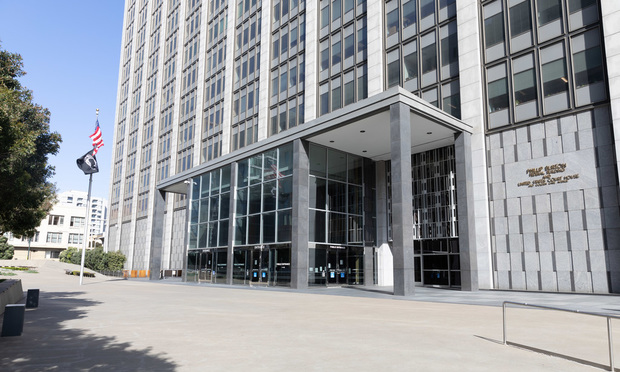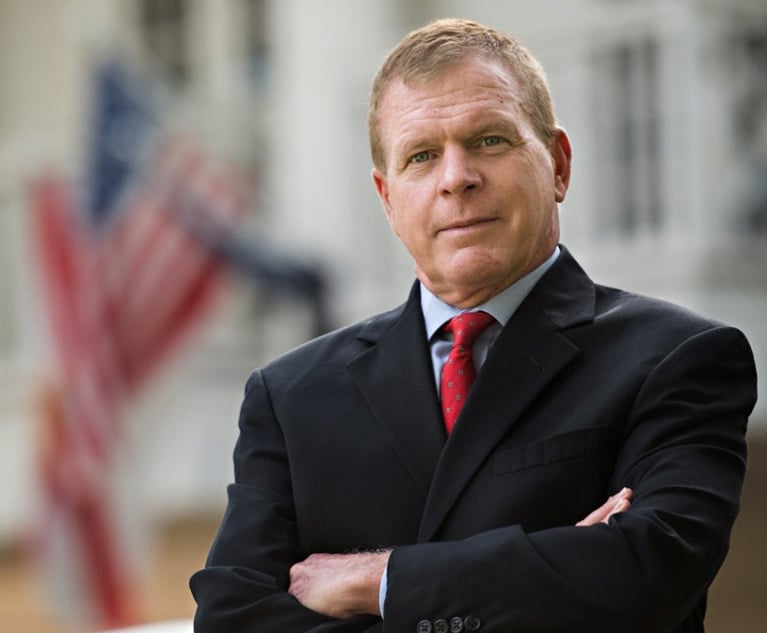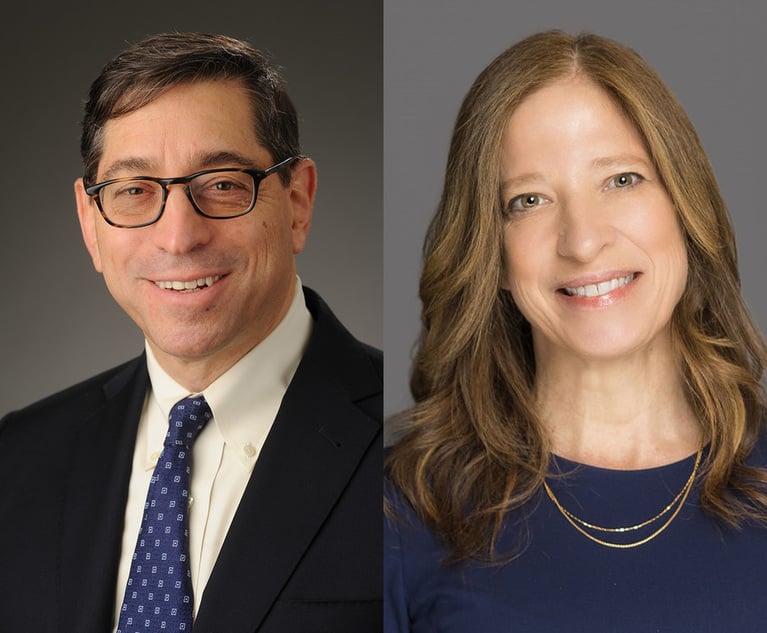Expanding Electronic Access to the Federal Courts: the Pandemic's Unexpected Opportunity
During this time of crisis, the courts have a chance to learn from the virtual ways they are doing their work.
April 21, 2020 at 01:19 PM
6 minute read
 Outside the Phillip Burton Federal Building on April 13, 2020, under the statewide shelter-in-place order. Photo: Jason Doiy/ALM
Outside the Phillip Burton Federal Building on April 13, 2020, under the statewide shelter-in-place order. Photo: Jason Doiy/ALM
The COVID-19 pandemic has dramatically disrupted our courts. Courthouses have been closed; hearings have been conducted with minimal staffing, held remotely or postponed; and court personnel have scrambled to work from home. Federal courts, which long have resisted electronic access and virtual proceedings, suddenly have had to implement emergency measures to facilitate them.
It would be disappointing if these measures simply were abandoned when the current circumstances have passed. While their first priority must be assuring the safety of court users and court staff, the courts also have an invaluable opportunity to study new ways of doing their work.
The Catalyst of Crisis
History teaches that crises can catalyze innovations that endure long after a crisis itself has ended. Efforts to mitigate the worst effects of the Great Depression permanently transformed government and left a legacy ranging from rural electrification to Social Security. It is doubtful that any of these changes would have occurred, at least when they did, had the disruption of our economy been less severe.
Our federal courts are widely respected for their independence, their professionalism and the seriousness they bring to their work. Social and partisan controversies aside, most federal judges decide most cases on the basis of competent evidence and applicable legal principles. This is not true in much of the world.
The federal courts also are a "small c" conservative institution. The same seriousness that inspires federal judges to produce high-quality work also leads them to be reflexively cautious about structural change. Properly concerned about the unintended consequences of different ways of doing things, the federal judiciary tends to consider new ideas infrequently, at length and in granular detail. Even the pilot projects it undertakes to study potential innovations are typically limited in scope and produce incremental results.
Such caution is valuable in normal times, but a disruption on the scale of the COVID-19 pandemic makes caution impossible. The public access to proceedings guaranteed by the Constitution is a physical impossibility given shelter-in-place orders and health risks to court users and personnel. Jury trials and in-person hearings are impracticable, movement of in-custody criminal defendants is fraught with logistical problems, and public presence in courtrooms and clerk's offices is not a realistic option. Even the U.S. Supreme Court, which long has eschewed any real-time transmission of its proceedings, now will hold telephonic hearings and provide a live feed to the media and the public. The importance of the remaining cases on the Court's docket made such a step necessary.
Considering Concerns With Remote Access
The Administrative Office of the U.S. Courts has issued guidance enabling lower federal courts to implement remote electronic access to most proceedings. Its directives stress that the guidance is temporary and will terminate once the current emergency has passed. This limitation was necessary because the authority to bypass existing rules is contained in legislation responding to the COVID-19 crisis.
Unfortunately, the emergency is unlikely to end soon. In the meantime, the courts' emergency measures will produce a bounty of data concerning each of the principal areas of concern that have been cited to support judicial reservations about greater use of virtual proceedings.
One such area is privacy. Understandably, courts are reluctant to see images of witnesses, parties, lawyers, jurors and judges on the internet or social media. The current exigencies could help courts find practical ways of balancing privacy interests with the transparency provided by virtual access.
Another concern is security. Even under normal circumstances. courts use metal detectors to screen visitors. And the identity of certain witnesses—usually cooperators in criminal cases—can be shielded from disclosure after appropriate judicial findings. The courts' experience in the present emergency could identify new ways to secure their electronic portals and to prevent harmful or unauthorized access to sensitive proceedings or information.
Other Constitutional rights are implicated by the use of virtual technologies. California's courts had to decide whether criminal defendants may be arraigned remotely during the emergency without waiving their right to be personally present. The courts concluded that a waiver still is required. It is doubtful that a remotely conducted jury trial would satisfy the Constitution's right of confrontation, at least absent consent. The current situation could enable in-depth thinking about the Constitutional dimensions of other remote proceedings.
Judges also worry about the impact of virtual operations on their own role. They express concern that lawyers will be less candid and that judges' ability to assess nonverbal cues will be diminished. They fear that lawyers will have less incentive to cooperate away from the courtroom. And appellate judges, who sit with other judges, have trepidation about adverse impacts on collaboration and collegiality. The COVID-19 pandemic has created an opportunity for the validity of these apprehensions to be tested.
The federal courts have recognized that the costs of civil litigation are unacceptably high and skew access to justice in favor of wealthy parties. More frequent virtual proceedings could reduce costs substantially by limiting the time lawyers and parties spend getting to and being in court. With appropriate waivers, virtual criminal proceedings could result in substantial savings in inmate transportation costs and a reduced burden on law enforcement officers.
While federal courts consistently do better than the other branches in opinion polls, a closer look at the data shows that public confidence in the courts has declined in recent years and that few outside the legal profession understand what judges actually do. There is a widespread (and mistaken) perception that judges decide every case on the basis of their political inclinations. Confidence also varies significantly across socioeconomic groups.
Transparency is a powerful antidote to such negativity. Virtual technologies have potential for both court users and public education. While some proceedings are more amenable to virtual access than others, treating courthouse walls as an outer boundary for real-time information is hard to justify in this digital age.
The federal courts should take advantage of the unexpected opportunity that the COVID-19 pandemic has presented. They should thoroughly review their experience over the course of the present emergency and act boldly on the basis of what they learn.
Jeremy Fogel is the executive director of the Berkeley Judicial Institute at Berkeley Law School. He is a former federal and state court judge and was director of the Federal Judicial Center from 2011 to 2018.
This content has been archived. It is available through our partners, LexisNexis® and Bloomberg Law.
To view this content, please continue to their sites.
Not a Lexis Subscriber?
Subscribe Now
Not a Bloomberg Law Subscriber?
Subscribe Now
NOT FOR REPRINT
© 2025 ALM Global, LLC, All Rights Reserved. Request academic re-use from www.copyright.com. All other uses, submit a request to [email protected]. For more information visit Asset & Logo Licensing.
You Might Like
View All

Restoring Antitrust: Returning to the Consumer Welfare Standard

New York Mayor Adams Attacks Fed Prosecutor's Independence, Appeals to Trump
5 minute read
Trending Stories
- 1Uber Files RICO Suit Against Plaintiff-Side Firms Alleging Fraudulent Injury Claims
- 2The Law Firm Disrupted: Scrutinizing the Elephant More Than the Mouse
- 3Inherent Diminished Value Damages Unavailable to 3rd-Party Claimants, Court Says
- 4Pa. Defense Firm Sued by Client Over Ex-Eagles Player's $43.5M Med Mal Win
- 5Losses Mount at Morris Manning, but Departing Ex-Chair Stays Bullish About His Old Firm's Future
Who Got The Work
J. Brugh Lower of Gibbons has entered an appearance for industrial equipment supplier Devco Corporation in a pending trademark infringement lawsuit. The suit, accusing the defendant of selling knock-off Graco products, was filed Dec. 18 in New Jersey District Court by Rivkin Radler on behalf of Graco Inc. and Graco Minnesota. The case, assigned to U.S. District Judge Zahid N. Quraishi, is 3:24-cv-11294, Graco Inc. et al v. Devco Corporation.
Who Got The Work
Rebecca Maller-Stein and Kent A. Yalowitz of Arnold & Porter Kaye Scholer have entered their appearances for Hanaco Venture Capital and its executives, Lior Prosor and David Frankel, in a pending securities lawsuit. The action, filed on Dec. 24 in New York Southern District Court by Zell, Aron & Co. on behalf of Goldeneye Advisors, accuses the defendants of negligently and fraudulently managing the plaintiff's $1 million investment. The case, assigned to U.S. District Judge Vernon S. Broderick, is 1:24-cv-09918, Goldeneye Advisors, LLC v. Hanaco Venture Capital, Ltd. et al.
Who Got The Work
Attorneys from A&O Shearman has stepped in as defense counsel for Toronto-Dominion Bank and other defendants in a pending securities class action. The suit, filed Dec. 11 in New York Southern District Court by Bleichmar Fonti & Auld, accuses the defendants of concealing the bank's 'pervasive' deficiencies in regards to its compliance with the Bank Secrecy Act and the quality of its anti-money laundering controls. The case, assigned to U.S. District Judge Arun Subramanian, is 1:24-cv-09445, Gonzalez v. The Toronto-Dominion Bank et al.
Who Got The Work
Crown Castle International, a Pennsylvania company providing shared communications infrastructure, has turned to Luke D. Wolf of Gordon Rees Scully Mansukhani to fend off a pending breach-of-contract lawsuit. The court action, filed Nov. 25 in Michigan Eastern District Court by Hooper Hathaway PC on behalf of The Town Residences LLC, accuses Crown Castle of failing to transfer approximately $30,000 in utility payments from T-Mobile in breach of a roof-top lease and assignment agreement. The case, assigned to U.S. District Judge Susan K. Declercq, is 2:24-cv-13131, The Town Residences LLC v. T-Mobile US, Inc. et al.
Who Got The Work
Wilfred P. Coronato and Daniel M. Schwartz of McCarter & English have stepped in as defense counsel to Electrolux Home Products Inc. in a pending product liability lawsuit. The court action, filed Nov. 26 in New York Eastern District Court by Poulos Lopiccolo PC and Nagel Rice LLP on behalf of David Stern, alleges that the defendant's refrigerators’ drawers and shelving repeatedly break and fall apart within months after purchase. The case, assigned to U.S. District Judge Joan M. Azrack, is 2:24-cv-08204, Stern v. Electrolux Home Products, Inc.
Featured Firms
Law Offices of Gary Martin Hays & Associates, P.C.
(470) 294-1674
Law Offices of Mark E. Salomone
(857) 444-6468
Smith & Hassler
(713) 739-1250








